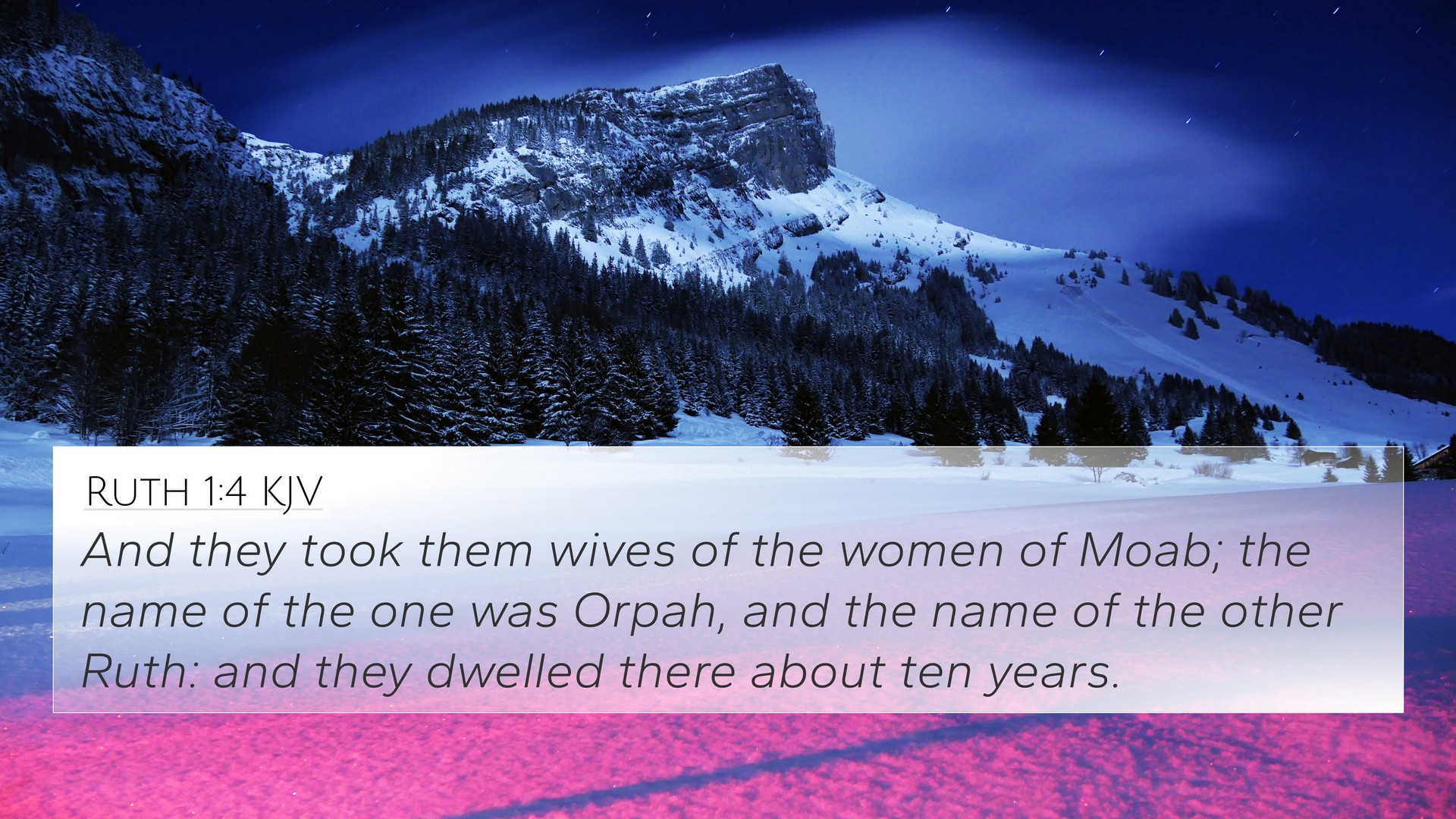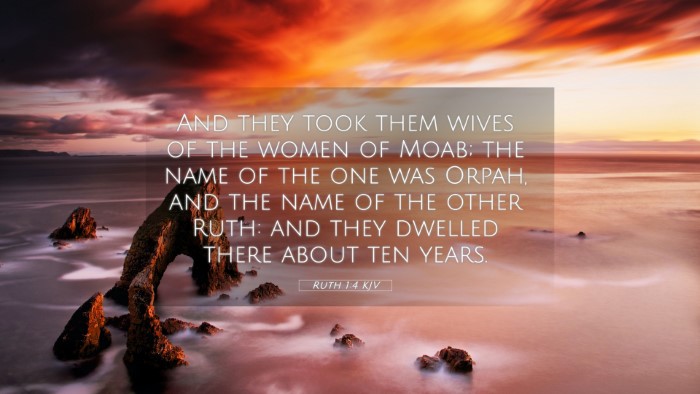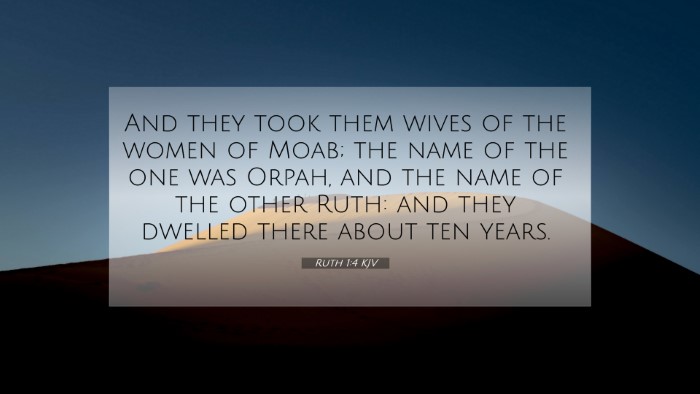Old Testament
Genesis Exodus Leviticus Numbers Deuteronomy Joshua Judges Ruth 1 Samuel 2 Samuel 1 Kings 2 Kings 1 Chronicles 2 Chronicles Ezra Nehemiah Esther Job Psalms Proverbs Ecclesiastes Song of Solomon Isaiah Jeremiah Lamentations Ezekiel Daniel Hosea Joel Amos Obadiah Jonah Micah Nahum Habakkuk Zephaniah Haggai Zechariah MalachiRuth 1:4 Similar Verses
Ruth 1:4 Cross References
And they took them wives of the women of Moab; the name of the one was Orpah, and the name of the other Ruth: and they dwelled there about ten years.
Uncover the Rich Themes and Topics of This Bible Verse
Listed below are the Bible themes associated with Ruth 1:4. We invite you to explore each theme to gain deeper insights into the Scriptures.
Ruth 1:4 Cross Reference Verses
This section features a detailed cross-reference designed to enrich your understanding of the Scriptures. Below, you will find carefully selected verses that echo the themes and teachings related to Ruth 1:4 KJV. Click on any image to explore detailed analyses of related Bible verses and uncover deeper theological insights.
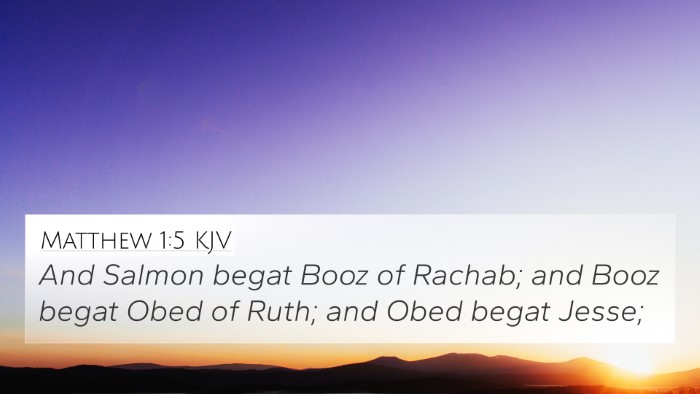
Matthew 1:5 (KJV) »
And Salmon begat Booz of Rachab; and Booz begat Obed of Ruth; and Obed begat Jesse;
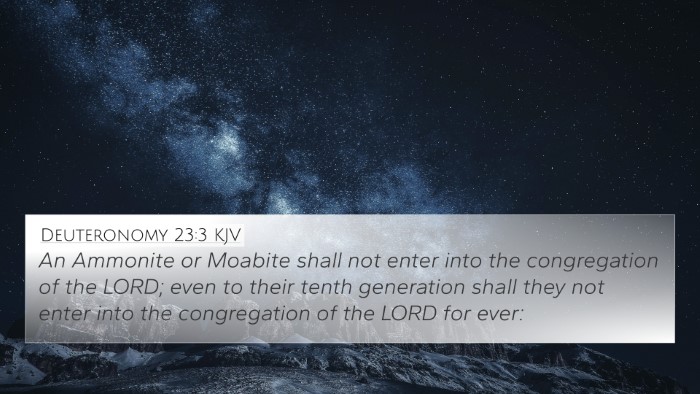
Deuteronomy 23:3 (KJV) »
An Ammonite or Moabite shall not enter into the congregation of the LORD; even to their tenth generation shall they not enter into the congregation of the LORD for ever:
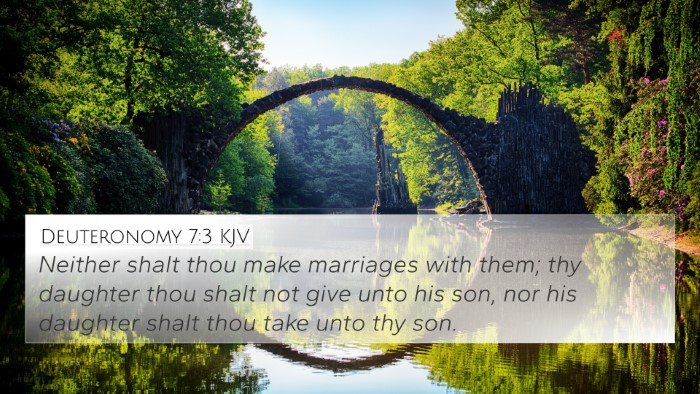
Deuteronomy 7:3 (KJV) »
Neither shalt thou make marriages with them; thy daughter thou shalt not give unto his son, nor his daughter shalt thou take unto thy son.
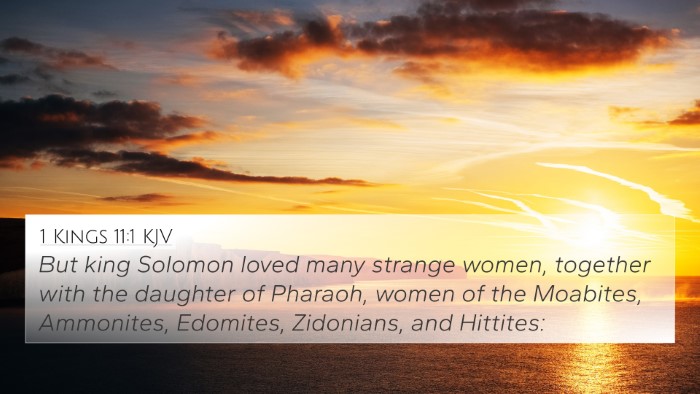
1 Kings 11:1 (KJV) »
But king Solomon loved many strange women, together with the daughter of Pharaoh, women of the Moabites, Ammonites, Edomites, Zidonians, and Hittites:
Ruth 1:4 Verse Analysis and Similar Verses
Understanding Ruth 1:4
Ruth 1:4 states: “And they took them wives of the women of Moab; the name of the one was Orpah, and the name of the other Ruth: and they dwelled there about ten years.” This verse provides a critical insight into the narrative of Ruth and the early establishment of her relationship with Naomi and her choice to follow her mother-in-law later in the story.
Verse Meaning and Context
The events in Ruth 1:4 take place during a time of famine in Bethlehem, prompting Elimelech and his family to migrate to Moab. This decision to marry Moabite women indicates both a cultural exchange and challenges faced by the Israelites in maintaining their identity amidst foreign influences.
Commentary Insights
-
Matthew Henry:
Henry notes the significance of the marriages to Moabite women, highlighting the ongoing struggle of the Israelites against intermingling with foreign cultures. He reflects on the implications of such unions and how they may lead to moral and spiritual decline.
-
Albert Barnes:
Barnes emphasizes the importance of Orpah and Ruth as pivotal characters in the narrative of redemption. Their names symbolically reflect fate and destiny, leading toward divine purposes that exceed ordinary circumstances.
-
Adam Clarke:
Clarke elaborates on the historical context, shedding light on the relationship between Israel and Moab. He discusses how this intermarriage foreshadows greater themes of acceptance, grace, and God's broader plan for inclusion, as seen through Ruth’s lineage.
Cross-References and Connections
Ruth 1:4 connects with several other Biblical texts, enhancing our understanding of themes such as family loyalty, divine providence, and God's redemptive plan. Below is a list of relevant cross-references:
- Deuteronomy 23:3-6: Caution regarding Moabite relationships due to historical enmity against Israel.
- Matthew 1:5: Ruth's inclusion in the genealogy of Christ highlights God's redemptive plan for all nations.
- Isaiah 56:6-7: Prophecy illustrating that those of foreign descent can be accepted in God's community.
- Luke 4:27: Jesus’ reference to the widow of Zarephath and Naaman the Syrian highlights God's grace extended beyond Israel.
- Genesis 19:36-38: Examines the origin of the Moabites and their complex relationship with Israel.
- 1 Corinthians 1:27-29: God’s choice of the lowly and despised to bring glory to Himself reflects the divine themes seen in Ruth's story.
- Psalm 87:4: Acknowledgment of those from foreign nations as God's people, echoing Ruth’s acceptance as an Israelite.
Thematic Connections
This verse illustrates key themes prevalent throughout Scripture:
- Faithfulness and Loyalty: As Ruth chooses to accompany Naomi later in the book, it highlights the virtue of steadfast love.
- Redemption: Ruth becomes a symbol of God's redemptive work within both individual lives and the nation of Israel.
- Grace and Inclusion: The narrative emphasizes that God’s grace extends beyond the ethnic boundaries of Israel.
Conclusion
Ruth 1:4 serves as a gateway to understanding the broader narrative of Ruth's life and her pivotal role in biblical history. By examining cross-references and thematic connections, one appreciates how intertwined narratives shape our understanding of God's providential plan.
